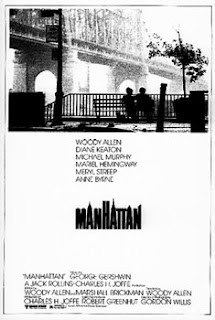Woody Allen: a
filmmaker many of us have mixed feelings about. I feel that’s how most of my
reviews about his films are going to start. He has written and directed very
funny movies, he certainly knows how to shoot in New York City, and apparently
he’s a pretty good jazz player. He is also a guy who married the adopted
daughter of his ex-wife, has been accused of sexual molestation, and in his
movies he often plays a character who dates women who are much younger than he
is. All of the good and the bad traits of Allen are on display in Manhattan (1979), one of his most
acclaimed movies.
I liked many
things about this movie when I first saw it. I enjoyed the use of black and
white cinematography, the opening montage in which Allen lauds his home turf of
NYC, the use of jazz music, and the cast of characters. However I was also
uncomfortable with the fact that Isaac Mortimer Davis, the 40-year-old TV writer
played by Allen, is in a relationship with Tracy (Mariel Hemmingway) a
17-year-old girl who is still in high school. I know it was the late 70s, but
even by the standards of that era wouldn’t that make Isaac a sexual predator
should their relationship ever get physical?
Cradle snatching
aside, you have to give props to Woody Allen for making one of the most New York
movies ever. Of course this is a New York that he recognizes and is filled with
characters he might have known in real life, but the opening shots were clearly
made by someone who idolizes the city. In fact, those are pretty much his exact
words as Isaac opens up the movie in a self-aware narration for a book he is
writing: “Chapter One. He adored New York City. He
idolized it all out of proportion. Eh uh, no, make that he, he romanticized it
all out of proportion. Better.”
Like
many of Allen’s characters Isaac is rather neurotic and has quite the
complicated history with women. His ex-wife Jill (Meryl Streep) is releasing a
tell-all book about their relationship and Isaac is none too happy about the
way he is described, even though Jill claims all the details are accurate. Further
hurting his ego is the fact that Jill left him for another woman (Karen
Ludwig). Isaac claims he took it pretty well, but by that he means he tried to
run them over with his car.
Further
complicating matters is the character of Mary Wilkie, played by Diane Keaton,
one of Allen’s great screen partners. Mary is in a relationship with Isaac’s
best friend Yale (Michael Murphy) who is married. Despite finding her snobbish
at first, Isaac develops feelings for Mary and thinks he might have more of a
future with her than with the much younger Tracy. Still with me?
Manhattan was one of Allen’s biggest box-office
successes, was nominated for many awards, and was deemed culturally significant
by the United States Library of Congress. However for my personal taste I think
there are funnier movies out there and I just can’t muster that much sympathy
for Isaac. The high point for me is the cinematography, especially the iconic
scene where Isaac and Mary are sitting in front of the Queensboro Bridge. Anybody
who loves either the city of New York, jazz or beautiful cinematography should
definitely see this movie at least once, but throughout I kept wondering why I should
care about the existential problems of a middle-aged man who is hanging out
with a minor.
Most
of the time you are supposed to dissociate an artist’s personal life from his
work. However when it comes to Woody Allen and Manhattan, I am afraid I just couldn’t separate the character
dating a high school girl from the director who married his ex-wife’s adopted
daughter.

Comments
Post a Comment